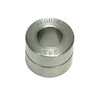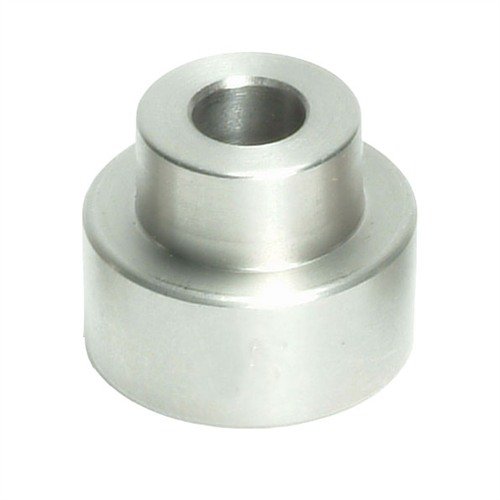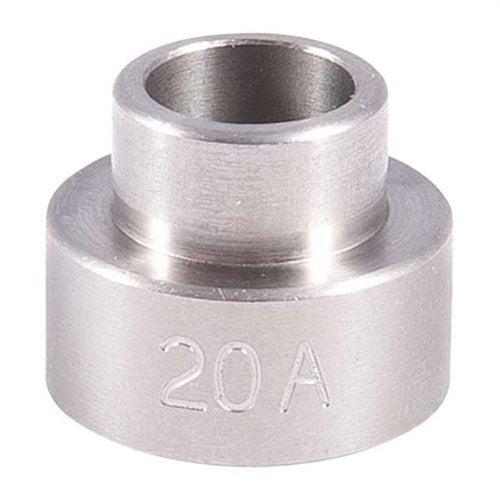Heat treated steel bushings. The sizing diameters are hand polished with a surface hardness of Rc 60-62 to reduce sizing effort. Bushings are available throughout the range of .185" thru .368" in .001" increments. The last three digits of the part (#RD73XXX) denotes bushing size. View other sizes: .185" to .250" .251" to .305" .306 to .368"
Determining Redding Bushing Size
The proper bushing size can be easily determined by measuring the outside neck diameter of your loaded cartridges with a precision micrometer or a dial caliper. Then, simply subtract .001" from the cartridge that had the smallest average neck diameter. This diameter bushing will generally size case necks just enough to create the proper press fit for the bullet.
If you are using a Type “S” style die and not turning the outside of your case necks, we suggest using a bushing .002" smaller than your smallest average neck diameter, and using the expander ball included with your Type “S” die. This size bushing will still give you minimal sizing (maximizing the life of your brass) and the expander ball will insure that each cartridge has the same bullet grip.
Redding has found that when you have cases with neck wall thicknesses on the thin side of the SAAMI tolerance, your fired case will measure considerably larger (.006" to .010" larger) than your loaded rounds. In these circumstances, Redding’s tests have shown that a bushing .001" larger (than the loaded round) may give you the desired bullet grip.
Casquillos de acero tratados térmicamente. Los diámetros de ajuste están pulidos a mano con una dureza superficial de Rc 60-62 para reducir el esfuerzo de ajuste. Los casquillos están disponibles en todo el rango de .185" a .368" en incrementos de .001". Los últimos tres dígitos de la parte (#RD73XXX) indican el tamaño del casquillo. Ver otros tamaños: .185" a .250" .251" a .305" .306 a .368"
Determinando el Tamaño del Casquillo Redding
El tamaño adecuado del casquillo se puede determinar fácilmente midiendo el diámetro exterior del cuello de tus cartuchos cargados con un micrómetro de precisión o un calibrador de carátula. Luego, simplemente resta .001" del cartucho que tuvo el diámetro promedio más pequeño. Este diámetro de casquillo generalmente ajustará los cuellos de los cartuchos lo suficiente para crear el ajuste adecuado para la bala.
Si estás utilizando un die de tipo “S” y no estás torneando el exterior de los cuellos de tus cartuchos, te sugerimos usar un casquillo .002" más pequeño que tu diámetro promedio más pequeño, y usar la bola expansora incluida con tu die de tipo “S”. Este tamaño de casquillo aún te dará un ajuste mínimo (maximizando la vida de tu latón) y la bola expansora asegurará que cada cartucho tenga el mismo agarre de bala.
Redding ha encontrado que cuando tienes cartuchos con grosores de pared del cuello en el lado delgado de la tolerancia SAAMI, tu cartucho disparado medirá considerablemente más grande (.006" a .010" más grande) que tus rondas cargadas. En estas circunstancias, las pruebas de Redding han demostrado que un casquillo .001" más grande (que la ronda cargada) puede darte el agarre de bala deseado.









